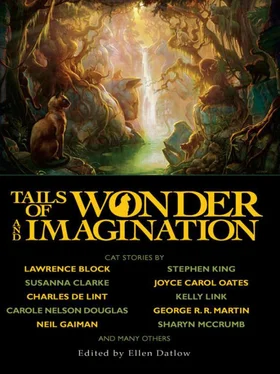Ellen Datlow - Tails of Wonder and Imagination
Здесь есть возможность читать онлайн «Ellen Datlow - Tails of Wonder and Imagination» весь текст электронной книги совершенно бесплатно (целиком полную версию без сокращений). В некоторых случаях можно слушать аудио, скачать через торрент в формате fb2 и присутствует краткое содержание. Год выпуска: 2010, ISBN: 2010, Издательство: Night Shade Books, Жанр: Фэнтези, Фантастика и фэнтези, Ужасы и Мистика, на английском языке. Описание произведения, (предисловие) а так же отзывы посетителей доступны на портале библиотеки ЛибКат.
- Название:Tails of Wonder and Imagination
- Автор:
- Издательство:Night Shade Books
- Жанр:
- Год:2010
- ISBN:978-1-59780-170-6
- Рейтинг книги:5 / 5. Голосов: 1
-
Избранное:Добавить в избранное
- Отзывы:
-
Ваша оценка:
- 100
- 1
- 2
- 3
- 4
- 5
Tails of Wonder and Imagination: краткое содержание, описание и аннотация
Предлагаем к чтению аннотацию, описание, краткое содержание или предисловие (зависит от того, что написал сам автор книги «Tails of Wonder and Imagination»). Если вы не нашли необходимую информацию о книге — напишите в комментариях, мы постараемся отыскать её.
collects the best of the last thirty years of science fiction and fantasy stories about cats from an all-star list of contributors.
Tails of Wonder and Imagination — читать онлайн бесплатно полную книгу (весь текст) целиком
Ниже представлен текст книги, разбитый по страницам. Система сохранения места последней прочитанной страницы, позволяет с удобством читать онлайн бесплатно книгу «Tails of Wonder and Imagination», без необходимости каждый раз заново искать на чём Вы остановились. Поставьте закладку, и сможете в любой момент перейти на страницу, на которой закончили чтение.
Интервал:
Закладка:
OLD FOSS IS THE NAME OF HIS CAT
David Sandner
David Sandner is Associate Professor of English at California State University, Fullerton, where he teaches Romanticism, Children’s literature, Popular literature and Creative Writing. His work appears in magazines such as Asimov’s Science Fiction , Realms of Fantasy , and Weird Tales , and anthologies such as Clockwork Phoenix , The Mammoth Book of Sorcerers’ Tales , and Baseball Fantastic . He edited Fantastic Literature: A Critical Reader , wrote The Fantastic Sublime, and co-edited The Treasury of the Fantastic .
Sandner comments: “Old Foss was a real cat—Edward Lear put him in his great Victorian nonsense poetry and drew funny caricatures of him. I’m sure Old Foss, like any good cat, regarded all this attention as only his due. Anyone who has read Lear’s poetry knows it’s very funny, written in a fine high nonsense style that leads directly to writers like Dr. Seuss, and yet it’s quite profoundly sad. That sadness seems based in loneliness. My story attempts to have its own high style, to let nonsense loose, and yet to approach Lear’s loneliness and his famous friendship with his cat. I wanted to achieve something like that balance Lear achieved—I guess so that I could understand it better because I find it so moving.”
He has many friends, laymen and clerical;
Old Foss is the name of his cat;
His body is perfectly speherical,
He weareth a runcible hat.
Old Foss watched the Old Man out barefoot in his nightshirt ranting in the rain; at least the rain had chased away the boys throwing mud and rocks. The Old Man had black stains along his back and a welt on his forehead, not that he noticed. But as night pushed over the town, growing from shadows leaning along the ramshackle red tile roofs, darkness spreading like ink across a tabletop, Old Foss knew there were worse things than rain or boys with rocks. Soon, the Jumblies would rise from the water’s edge to bring the Old Man to sea in a sieve. And anyone who goes to sea in a sieve, of course, never returns. They sink and they drown.
The rain wept against the glass as Old Foss watched impassively behind the window. The Old Man ran back and forth across the cobbled street, his long white nightshirt soaked and clinging to his ungainly frame, his paunched belly and skinny pale legs. His long bedraggled beard leaked, sloughing off water when he shook his head and bellowed: “Where is my Jumbly Girl?” The Old Man knocked on every door he came to, but no one answered for they knew the old Englishman too well.
At first, when the fugues came on, the locals had only shaken their heads at him, then argued with him in broken English or too fluent Italian, especially when the rain came up fast. They pushed him towards the villa he and Old Foss rented; but when the confusion came upon him he would only look at them uncomprehendingly, or look at their doors long after they had shut them with the oddest expression of thwarted desire, then he would wander away again and knock on another wrong door. For no one could see the Jumblies but him and Old Foss. None could know of his time with his Jumbly Girl but Old Foss and himself. Old Foss and he is how it should be for the Jumbly girl would bring him only death for all her promises. Why couldn’t he see that, Old Foss thought crossly, twitching his tail, and was it really so much as all that to love a Jumbly Girl?
The sun reflected blindingly on the sand and burst across the blue water in shimmers and rolling spots of light, like crystal broken on tile, like sparks shooting and spinning into the air from a roaring fire, like nothing the Old Man could capture on his canvas.
“It’s like nothing, Old Foss, why can’t the poets ever say that? It’s like nothing we can see or say, like something more than we can know, like less than I can rhyme and more than I can show.”
The Old Man dabbed at the canvas anyway with his paintbrushes, trying to somehow put a glimmer of white behind, between, before smears of blue. He swayed his pear-shaped body, shoved into a too tight brown suit, frayed white cuffs showing at the wrists, coat open to display a mismatched plaid vest missing every other button; he moved from side to side considering the canvas from different angles, cocking his head with deliberation. How to capture the certain slant of light, the moment out of joint, when time pulsed below the threshold of meaning before it can be said? He took the painting off its easel, still rickety in the soft sand, and flung it end over end into the sea.
“Old Foss, what shall we do instead? What is it this moment deserves?”
Old Foss, striped orange and black, fat and with a wide, full tail, lay on a red-checked picnic blanket in a way no human would ever know—stretched out backwards almost in upon himself again, only his tail’s end moving when a wind ruffled his fur, only his ears listening; he hadn’t moved for an hour. It was what Old Foss considered giving the moment its due already. When Old Foss opened his eyes suddenly it was not to answer the Old Man, but to look out to sea after the canvas. He made one mew.
“What’s that?” The Old Man turned to look, and his rotund body seemed to deflate and go limp, his mouth slack, opening in a kind of dumb wonder. The Jumblies sailed out of nothing—or from the edge of things, but too fast, sailing out of his discarded canvas, glancing off blinding light to land on the white sand beach, singing sea chanteys, and laughing too loud like prisoners before a gallows or dreamers awakened too soon from perfect dreams.
The Jumblies sailed in a sieve of glinting polished silver with holes and holes and holes that spouted water as they ran before the wind with a mast made of an upright coat-rack and a sail of fine, aged Swiss cheese stitched with red and gold thread.
“This can’t be good,” Old Foss said.
The Old Man blinked and without taking his eyes from the Jumblies said, “why can I only sometimes understand you? Sometimes you are just a cat and other times a voice, a friend. Why is that, Old Foss?”
“I am always your friend,” Old Foss said, “only you are sometimes deaf. I don’t know why.”
The Jumblies tumbled out and came galumphing up the shore all together, kicking up sand with their bootheels, until they seemed to arrive in a heap before the Old Man and Old Foss, their green gangly arms stuck out at odd angles, eyes peering from the most unlikely spaces, under elbows and over shoulders, and who was who and which was which and how many were there and how did they move all together like that were questions that could not be asked or answered so the Old Man didn’t bother. They were pea green except when they smiled, then they shifted to a kind of off-blue. They smiled at the Old Man just then, bluely.
“Will you come with us,” they asked, “to the sea in our shining sieve?” They smiled in a beguiling manner with teeth half-sharpened but blindingly white, and shuffled about together in a way that made the Old Man ache with longing to belong to something as they belonged—it was a dream of empathy, that heap of blue inhumanity smiling up at him, of being so close to others that one speaks as another speaks and each knows what is meant, not something else but just that and every word, at last—finally!—meaning what it means and not so many other things, not a tragic failing off to loneliness, to war, to hunger, to darkness, to death.
“We will see such sights as never have been seen by you or any of yours. We will trade baubles with the Keepers of the sixty winds in their caverns beyond the edge of things; we will live where the Bong-Tree grows in the endless summer of the islands of the sun; we will sail beyond the stars, lifted by Phoenix birds into the sky on silver ropes held in their fiery beaks and we will tread the inky darkness until we reach the river of night and dream along its banks of unknown things. What do you say?” There was a pause. “You must say.”
Читать дальшеИнтервал:
Закладка:
Похожие книги на «Tails of Wonder and Imagination»
Представляем Вашему вниманию похожие книги на «Tails of Wonder and Imagination» списком для выбора. Мы отобрали схожую по названию и смыслу литературу в надежде предоставить читателям больше вариантов отыскать новые, интересные, ещё непрочитанные произведения.
Обсуждение, отзывы о книге «Tails of Wonder and Imagination» и просто собственные мнения читателей. Оставьте ваши комментарии, напишите, что Вы думаете о произведении, его смысле или главных героях. Укажите что конкретно понравилось, а что нет, и почему Вы так считаете.












